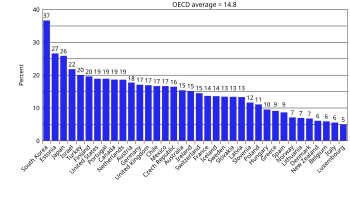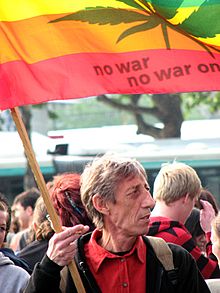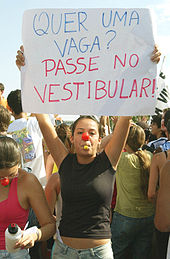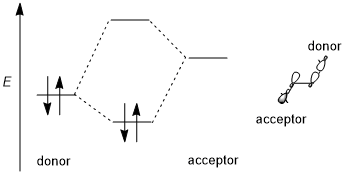In human social affairs, discrimination
is treatment or consideration of, or making a distinction towards, a
person based on the group, class, or category to which the person is
perceived to belong. These include age, colour, convictions for which a pardon has been granted or a record suspended, disability, ethnicity, family status, gender identity, genetic characteristics, marital status, nationality, race, religion, sex, and sexual orientation.
Discrimination consists of treatment of an individual or group, based
on their actual or perceived membership in a certain group or social
category, "in a way that is worse than the way people are usually
treated".
It involves the group's initial reaction or interaction going on to
influence the individual's actual behavior towards the group leader or
the group, restricting members of one group from opportunities or
privileges that are available to another group, leading to the exclusion of the individual or entities based on illogical or irrational decision making.
Discriminatory traditions, policies, ideas, practices and laws exist in many countries and institutions in every part of the world, including in territories where discrimination is generally looked down upon. In some places, controversial attempts such as quotas have been used to benefit those who are believed to be current or past victims of discrimination—but they have sometimes been called reverse discrimination.
Etymology
Definitions
Moral philosophers have defined discrimination as disadvantageous treatment or consideration. This is a comparative definition. An individual need not be actually harmed in order to be discriminated against. They just need to be treated worse than others for some arbitrary reason. If someone decides to donate to help orphan children, but decides to donate less, say, to black children out of a racist attitude, then they would be acting in a discriminatory way despite the fact that the people they discriminate against actually benefit by receiving a donation. In addition to this discrimination develops into a source of oppression. It is similar to the action of recognizing someone as 'different' so much that they are treated inhumanly and degraded.Based on realistic-conflict theory and social-identity theory, Rubin and Hewstone have highlighted a distinction among three types of discrimination:
- Realistic competition is driven by self-interest and is aimed at obtaining material resources (e.g., food, territory, customers) for the in-group (e.g., favouring an in-group in order to obtain more resources for its members, including the self).
- Social competition is driven by the need for self-esteem and is aimed at achieving a positive social status for the in-group relative to comparable out-groups (e.g., favouring an in-group in order to make it better than an out-group).
- Consensual discrimination is driven by the need for accuracy and reflects stable and legitimate intergroup status hierarchies (e.g., favouring a high-status in-group because it is high status).
Types
Age
Ageism or age discrimination is discrimination and stereotyping based on the grounds of someone's age. It is a set of beliefs, norms, and values which used to justify discrimination or subordination based on a person's age. Ageism is most often directed towards old people, or adolescents and children.Age discrimination in hiring has been shown to exist in the United States. Joanna Lahey, professor at The Bush School of Government and Public Service at Texas A&M, found that firms are more than 40% more likely to interview a young adult job applicant than an older job applicant. In Europe, Stijn Baert, Jennifer Norga, Yannick Thuy and Marieke Van Hecke, researchers at Ghent University, measured comparable ratios in Belgium. They found that age discrimination is heterogeneous by the activity older candidates undertook during their additional post-educational years. In Belgium, they are only discriminated if they have more years of inactivity or irrelevant employment.
In a survey for the University of Kent, England, 29% of respondents stated that they had suffered from age discrimination. This is a higher proportion than for gender or racial discrimination. Dominic Abrams, social psychology professor at the university, concluded that ageism is the most pervasive form of prejudice experienced in the UK population.
Caste
According to UNICEF and Human Rights Watch, caste discrimination affects an estimated 250 million people worldwide. Discrimination based on caste, as perceived by UNICEF, is mainly prevalent in parts of Asia, (India, Sri Lanka, Bangladesh, China, Pakistan, Nepal, Japan), Africa and others. As of 2011, there were 200 million Dalits or Scheduled Castes (formerly known as "untouchables") in India.Disability
Discrimination against people with disabilities in favor of people who are not is called ableism or disablism. Disability discrimination, which treats non-disabled individuals as the standard of 'normal living', results in public and private places and services, education, and social work that are built to serve 'standard' people, thereby excluding those with various disabilities. Studies have shown, employment is needed to not only provide a living but to sustain mental health and well-being. Work fulfils a number of basic needs for an individual such as collective purpose, social contact, status, and activity. A person with a disability is often found to be socially isolated and work is one way to reduce isolation.In the United States, the Americans with Disabilities Act mandates the provision of equality of access to both buildings and services and is paralleled by similar acts in other countries, such as the Equality Act 2010 in the UK.
Language
Diversity of language is protected and respected by most nations who value cultural diversity. However, people are sometimes subjected to different treatment because their preferred language is associated with a particular group, class or category. Notable examples are the Anti-French sentiment in the United States as well as the Anti-Quebec sentiment in Canada targeting people who speak the French language. Commonly, the preferred language is just another attribute of separate ethnic groups. Discrimination exists if there is prejudicial treatment against a person or a group of people who either do or do not speak a particular language or languages.
Another noteworthy example of linguistic discrimination is the backdrop to the Bengali Language Movement in erstwhile Pakistan, a political campaign that played a key role in the creation of Bangladesh. In 1948, Mohammad Ali Jinnah declared Urdu as the national language of Pakistan and branded those supporting the use of Bengali, the most widely spoken language in the state, as enemies of the state.
Language discrimination is suggested to be labeled linguicism or logocism. Anti-discriminatory and inclusive efforts to accommodate persons who speak different languages or cannot have fluency in the country's predominant or "official" language, is bilingualism such as official documents in two languages, and multiculturalism in more than two languages.
Name
Discrimination based on a person's name may also occur, with research suggesting the presence of discrimination based on name meaning, pronunciation, uniqueness, gender affiliation, and racial affiliation. Research has further shown that real world recruiters spend an average of just six seconds reviewing each résumé before making their initial "fit/no fit" screen-out decision and that a person's name is one of the six things they focus on most. France has made it illegal to view a person's name on a résumé when screening for the initial list of most qualified candidates. Great Britain, Germany, Sweden, and the Netherlands have also experimented with name-blind résumé processes. Some apparent discrimination may be explained by other factors such as name frequency. The effects of name discrimination based on name fluency is subtle, small and subject significantly to changing norms.Nationality
Discrimination on the basis of nationality is usually included in employment laws. It is sometimes referred to as bound together with racial discrimination although it can be separate. It may vary from laws that stop refusals of hiring based on nationality, asking questions regarding origin, to prohibitions of firing, forced retirement, compensation and pay, etc., based on nationality.Discrimination on the basis of nationality may show as a "level of acceptance" in a sport or work team regarding new team members and employees who differ from the nationality of the majority of team members.
In the UAE and other GCC states, for instance, nationality is not frequently given to residents and expatriates. In the workplace, preferential treatment is given to full citizens, even though many of them lack experience or motivation to do the job. State benefits are also generally available for citizens only.
Race or ethnicity
Anti-Arab sign in Pattaya Beach, Thailand
German warning in German-occupied Poland 1939 - "No entrance for Poles!"
Antisemitic graffiti in Lithuania. The signs read "Jews out" and "Hate"
An African-American child at a segregated drinking fountain on a courthouse lawn, North Carolina, US 1938.
Racial and ethnic discrimination differentiates individuals on the basis of real and perceived racial and ethnic differences and leads to various forms of the ethnic penalty. It has been official government policy in several countries, such as South Africa during the apartheid era. Discriminatory policies towards ethnic minorities include the race-based discrimination of ethnic Indians and Chinese in Malaysia After the Vietnam war, many Vietnamese refugees moved to the United States, where they face discrimination. Many studies report lower private sector earnings for racial minorities, although it is often difficult to determine the extent to which this is the result of racial discrimination.
As of 2013, aboriginal people (First Nations, Métis, and Inuit) comprise 4 percent of Canada's population, but they account for 23.2 percent of the federal prison population. According to the Australian government's June 2006 publication of prison statistics, Aborigines make up 24% of the overall prison population in Australia.
In 2004, Māori made up just 15% of the total population of New Zealand but 49.5% of prisoners. Māori were entering prison at eight times the rate of non-Māori. A quarter of the people in England's prisons are from an ethnic minority. The Equality and Human Rights Commission found that in England and Wales as of 2010, a black person was five times more likely to be imprisoned than a white person. The discrepancy was attributed to "decades of racial prejudice in the criminal justice system".
In the United States, racial profiling of minorities by law-enforcement officials has been called racial discrimination.
Within the criminal justice system in the United States, minorities are convicted and imprisoned disproportionately when compared to the majority. As early as 1866, the Civil Rights Act and Civil Rights Act of 1871 provided a remedy for intentional racism in employment by private employers and state and local public employers. The Civil Rights Act of 1991 expanded the damages available in Title VII cases and granted Title VII plaintiffs the right to a jury trial.
Racial discrimination in hiring has been shown to exist in the United States and in Europe. Using a field experiment, Marianne Bertrand and Sendhil Mullainathan showed that applications from job candidates with white-sounding names received 50 percent more callbacks for interviews than those with African-American-sounding names in the United States at the start of this millennium. A 2009 study by Devah Pager, Bruce Western, and Bart Bonikowski found that black applicants to low-wage jobs were half as likely as identically qualified white applicants to receive callbacks or job offers. More recently, Stijn Baert, Bart Cockx, Niels Gheyle and Cora Vandamme replicated and extended their field experiment in Belgium, Europe. They found that racial discrimination in the labour market is heterogeneous by the labour market tightness in the occupation: compared to natives, candidates with a foreign-sounding name are equally often invited to a job interview in Belgium if they apply for occupations for which vacancies are difficult to fill, but they have to send twice as many applications for occupations for which labor market tightness is low.
Region
Regional or geographic discrimination is discrimination based on the region in which a person lives or was born. It differs from national discrimination in that it may not be based on national borders or the country the victim lives in, but is instead based on prejudices against a specific region of one or more countries. Examples include discrimination against Chinese born in countryside far from city within China, and discrimination against Americans from the southern or northern regions of the United States. It is often accompanied by discrimination based on accent, dialect, or cultural differences.Religious beliefs
In the 1990s, Bhutan expelled or forced to leave its Hindu population in the name of preserving its Buddhist culture and identity.
Religious discrimination is valuing or treating a person or group differently because of what they do or do not believe or because of their feelings towards a given religion. For instance, the indigenous Christian population of the Balkans, known as the "rayah" or the "protected flock", was discriminated against under the Ottoman Kanun–i–Rayah. The word is sometimes translated as 'cattle' rather than 'flock' or 'subjects' in order to emphasize the Christian population's inferior status to that of the Muslim rayah.
Restrictions upon Jewish occupations were imposed by Christian authorities. Local rulers and church officials closed many professions to religious Jews, pushing them into marginal roles considered socially inferior, such as tax and rent collecting and moneylending, occupations only tolerated as a "necessary evil". The number of Jews permitted to reside in different places was limited; they were concentrated in ghettos and were not allowed to own land.
In a 1979 consultation on the issue, the United States commission on civil rights defined religious discrimination in relation to the civil rights guaranteed by the Fourteenth Amendment to the United States Constitution. Whereas religious civil liberties, such as the right to hold or not to hold a religious belief, are essential for Freedom of Religion (in the United States secured by the First Amendment), religious discrimination occurs when someone is denied "the equal protection of the laws, equality of status under the law, equal treatment in the administration of justice, and equality of opportunity and access to employment, education, housing, public services and facilities, and public accommodation because of their exercise of their right to religious freedom".
In 2015, attorney and author Roberta Kaplan stated that Kentucky county clerk Kim Davis "is the clearest example of someone who wants to use a religious liberty argument to discriminate".
Sex, sex characteristics, gender, and gender identity
Though gender discrimination and sexism refer to beliefs and attitudes in relation to the gender of a person, such beliefs and attitudes are of a social nature and do not, normally, carry any legal consequences. Sex discrimination, on the other hand, may have legal consequences. Though what constitutes sex discrimination varies between countries, the essence is that it is an adverse action taken by one person against another person that would not have occurred had the person been of another sex. Discrimination of that nature is considered a form of prejudice and in certain enumerated circumstances is illegal in many countries.Sexual discrimination can arise in different contexts. For instance, an employee may be discriminated against by being asked discriminatory questions during a job interview, or by an employer not hiring or promoting, unequally paying, or wrongfully terminating, an employee based on their gender.
The gender gap in median earnings of full-time employees according to the OECD 2015.
Median weekly earnings of full-time wage and salary workers, by sex, race, and ethnicity, U.S., 2009.
The United Nations had concluded that women often experience a "glass ceiling" and that there are no societies in which women enjoy the same opportunities as men. The term "glass ceiling" is used to describe a perceived barrier to advancement in employment based on discrimination, especially sex discrimination. In the United States in 1995, the Glass Ceiling Commission, a government-funded group, stated: "Over half of all Master's degrees are now awarded to women, yet 95% of senior-level managers, of the top Fortune 1000 industrial and 500 service companies are men. Of them, 97% are white." In its report, it recommended affirmative action, which is the consideration of an employee's gender and race in hiring and promotion decisions, as a means to end this form of discrimination. As of 2010, women accounted for 51% of workers in high-paying management, professional, and related occupations. They outnumbered men in such occupations as public relations managers, financial managers, and human resource managers.
In addition, women are found to experience a sticky floor. While a glass ceiling implies that women are less like to reach the top of the job ladder, a sticky floor is defined as the pattern that women are, compared to men, less likely to start to climb the job ladder. A sticky floor is related to gender differences at the bottom of the wage distribution. It might be explained by both employer discrimination and gender differences in career aspirations.
Intersex persons experience discrimination due to innate, atypical sex characteristics. Multiple jurisdictions now protect individuals on grounds of intersex status or sex characteristics. South Africa was the first country to explicitly add intersex to legislation, as part of the attribute of 'sex'. Australia was the first country to add an independent attribute, of 'intersex status'. Malta was the first to adopt a broader framework of 'sex characteristics', through legislation that also ended modifications to the sex characteristics of minors undertaken for social and cultural reasons.
Transgender individuals, whether male-to-female, female-to-male, or genderqueer, often experience transphobic problems that often lead to dismissals, underachievement, difficulty in finding a job, social isolation, and, occasionally, violent attacks against them. Nevertheless, the problem of gender discrimination does not stop at transgender individuals or with women. Men are often the victim in certain areas of employment as men begin to seek work in office and childcare settings traditionally perceived as "women's jobs". One such situation seems to be evident in a recent case concerning alleged YMCA discrimination and a Federal Court Case in Texas. The case actually involves alleged discrimination against both men and black people in childcare, even when they pass the same strict background tests and other standards of employment. It is currently being contended in federal court, as of fall 2009.
Discrimination in slasher films is relevant. Gloria Cowan had a research group study on 57 different slasher films. Their results showed that the non-surviving females were more frequently sexual than the surviving females and the non-surviving males. Surviving as a female slasher victim was strongly associated with the absence of sexual behavior. In slasher films, the message appears to be that sexual women get killed and only the pure women survive, thus reinforcing the idea that female sexuality can be costly.
Sexual orientation
LGBT activists at Cologne Pride carrying a banner with the flags of over 70 countries where homosexuality is illegal.
Protests in New York City against Uganda's Anti-Homosexuality Bill.
One's sexual orientation is a "predilection for homosexuality, heterosexuality, or bisexuality". Like most minority groups, homosexuals and bisexuals are vulnerable to prejudice and discrimination from the majority group. They may experience hatred from others because of their sexual preferences; a term for such hatred based upon one’s sexual orientation is often called homophobia. Many continue to hold negative feelings towards those with non-heterosexual orientations and will discriminate against people who have them or are thought to have them. People of other uncommon sexual orientations also experience discrimination. One study found its sample of heterosexuals to be more prejudiced against asexuals than to homosexuals or bisexuals.
Employment discrimination based on sexual orientation varies by country. Revealing a lesbian sexual orientation (by means of mentioning an engagement in a rainbow organisation or by mentioning one's partner name) lowers employment opportunities in Cyprus and Greece but overall, it has no negative effect in Sweden and Belgium. In the latter country, even a positive effect of revealing a lesbian sexual orientation is found for women at their fertile ages.
Besides these academic studies, in 2009, ILGA published a report based on research carried out by Daniel Ottosson at Södertörn University College, Stockholm, Sweden. This research found that of the 80 countries around the world that continue to consider homosexuality illegal, five carry the death penalty for homosexual activity, and two do in some regions of the country. In the report, this is described as "State sponsored homophobia". This happens in Islamic states, or in two cases regions under Islamic authority. On February 5, 2005, the IRIN issued a reported titled "Iraq: Male homosexuality still a taboo". The article stated, among other things that honor killings by Iraqis against a gay family member are common and given some legal protection. In August 2009, Human Rights Watch published an extensive report detailing torture of men accused of being gay in Iraq, including the blocking of men's anuses with glue and then giving the men laxatives. Although gay marriage has been legal in South Africa since 2006, same-sex unions are often condemned as "un-African". Research conducted in 2009 shows 86% of black lesbians from the Western Cape live in fear of sexual assault.
A number of countries, especially those in the Western world, have passed measures to alleviate discrimination against sexual minorities, including laws against anti-gay hate crimes and workplace discrimination. Some have also legalized same-sex marriage or civil unions in order to grant same-sex couples the same protections and benefits as opposite-sex couples. In 2011, the United Nations passed its first resolution recognizing LGBT rights.
Drug use
Global Marijuana March, Paris.
Drug use discrimination is the unequal treatment people experience because of the drugs they use. People who use or have used illicit drugs may face discrimination in employment, welfare, housing, child custody, and travel, in addition to imprisonment, asset forfeiture, and in some cases forced labor, torture, and execution. Though often prejudicially stereotyped as deviants and misfits, most drug users are well-adjusted and productive members of society. Drug prohibitions may have been partly motivated by racism and other prejudice against minorities, and racial disparities have been found to exist in the enforcement and prosecution of drug laws. Discrimination due to illicit drug use was the most commonly reported type of discrimination among Blacks and Latinos in a 2003 study of minority drug users in New York City, double to triple that due to race. People who use legal drugs such as tobacco and prescription medications may also face discrimination.
Ideas of self-ownership and cognitive liberty affirm rights to use drugs, whether for medicine recreation, or spiritual fulfilment. Those espousing such ideas question the legality of drug prohibition and cite the rights and freedoms enshrined in such documents as the Declaration of Independence, the U.S. Constitution and Bill of Rights, the European Convention on Human Rights, and the Universal Declaration of Human Rights, as protecting personal drug choices. They are inspired by and see themselves following in the tradition of those who have struggled against other forms of discrimination in the past.
Drug policy reform organizations such as the Drug Policy Alliance, the Drug Equality Alliance, the Transform Drug Policy Foundation, and the Beckley Foundation have highlighted the issue of stigma and discrimination in drug policy. The Partnership for Drug-Free Kids also recognizes this issue and shares on its website stories that "break through the stigma and discrimination that people with drug or drinking problems often face."
A report issued by the Global Commission on Drug Policy, critical of the global war on drugs, states, under "Undermining Human Rights, Fostering Discrimination":
Punitive approaches to drug policy are severely undermining human rights in every region of the world. They lead to the erosion of civil liberties and fair trial standards, the stigmatization of individuals and groups – particularly women, young people, and ethnic minorities – and the imposition of abusive and inhumane punishments.Although still illegal at the federal level, about half of U.S. states have legalized marijuana for medical use and several of those states have laws, or are considering legislation, specifically protecting medical marijuana patients from discrimination in such areas as education, employment, housing, child custody, and organ transplantation.
Reverse discrimination
Students protesting against racial quotas in Brazil: "Quer uma vaga? Passe no vestibular!" ("Do you want a spot? Pass the entrance exam!")
In the US, a government policy known as affirmative action was instituted to encourage employers and universities to seek out and accept groups such as African Americans and women, who have been subject to discrimination for a long time.
Some attempts at antidiscrimination have been criticized as reverse discrimination. In particular, minority quotas (for example, affirmative action) may discriminate against members of a dominant or majority group or other minority groups. In its opposition to race preferences, the American Civil Rights Institute's Ward Connerly stated, "There is nothing positive, affirmative, or equal about 'affirmative action' programs that give preference to some groups based on race."
Legislation
Australia CanadaHong Kong
- Sex Discrimination Ordinance (1996)
- Prohibition of Discrimination in Products, Services and Entry into Places of Entertainment and Public Places Law, 2000
- Employment (Equal Opportunities) Law, 1988
- Article 137c, part 1 of Wetboek van Strafrecht prohibits insults towards a group because of its race, religion, sexual orientation (straight or gay), handicap (somatically, mental or psychiatric) in public or by speech, by writing or by a picture. Maximum imprisonment one year of imprisonment or a fine of the third category.
- Part 2 increases the maximum imprisonment to two years and the maximum fine category to 4, when the crime is committed as a habit or is committed by two or more persons.
- Article 137d prohibits provoking to discrimination or hate against the group described above. Same penalties apply as in article 137c.
- Article 137e part 1 prohibits publishing a discriminatory statement, other than in formal message, or hands over an object (that contains discriminatory information) otherwise than on his request. Maximum imprisonment is 6 months or a fine of the third category.
- Part 2 increases the maximum imprisonment to one year and the maximum fine category to 4, when the crime is committed as a habit or committed by two or more persons.
- Article 137f prohibits supporting discriminatory activities by giving money or goods. Maximum imprisonment is 3 months or a fine of the second category.
- Equal Pay Act 1970 – provides for equal pay for comparable work
- Sex Discrimination Act 1975 – makes discrimination against women or men, including discrimination on the grounds of marital status, illegal in the workplace.
- Human Rights Act 1998 – provides more scope for redressing all forms of discriminatory imbalances
- Equal Pay Act of 1963[147] – (part of the Fair Labor Standards Act) – prohibits wage discrimination by employers and labor organizations based on sex
- Civil Rights Act of 1964 – many provisions, including broadly prohibiting discrimination in the workplace including hiring, firing, workforce reduction, benefits, and sexually harassing conduct
- Fair Housing Act of 1968 prohibited discrimination in the sale or rental of housing based on race, color, national origin, religion, sex, familial status, or disability. The Office of Fair Housing and Equal Opportunity is charged with administering and enforcing the Act.
- Pregnancy Discrimination Act, which amended Title VII of the Civil Rights Act of 1964 – covers discrimination based upon pregnancy in the workplace
- Violence Against Women Act
- Racism is still rampant in real estate
United Nations documents
Important UN documents addressing discrimination include:- The Universal Declaration of Human Rights is a declaration adopted by the United Nations General Assembly on 10 December 1948. It states that:" Everyone is entitled to all the rights and freedoms set forth in this Declaration, without distinction of any kind, such as race, colour, sex, language, religion, political or other opinion, national or social origin, property, birth or other status."
- The International Convention on the Elimination of All Forms of Racial Discrimination (ICERD) is a United Nations convention. The Convention commits its members to the elimination of racial discrimination. The convention was adopted and opened for signature by the United Nations General Assembly on 21 December 1965, and entered into force on 4 January 1969.
- The Convention on the Elimination of All Forms of Discrimination against Women (CEDAW) is an international treaty adopted in 1979 by the United Nations General Assembly. Described as an international bill of rights for women, it came into force on 3 September 1981.
- The Convention on the Rights of Persons with Disabilities is an international human rights instrument treaty of the United Nations. Parties to the Convention are required to promote, protect, and ensure the full enjoyment of human rights by persons with disabilities and ensure that they enjoy full equality under the law. The text was adopted by the United Nations General Assembly on 13 December 2006, and opened for signature on 30 March 2007. Following ratification by the 20th party, it came into force on 3 May 2008.
Theories
Social theories such as egalitarianism assert that social equality should prevail. In some societies, including most developed countries, each individual's civil rights include the right to be free from government sponsored social discrimination. Due to a belief in the capacity to perceive pain or suffering shared by all animals, "abolitionist" or "vegan" egalitarianism maintains that the interests of every individual (regardless its species), warrant equal consideration with the interests of humans, and that not doing so is "speciesist".Labeling theory
Discrimination, in labeling theory, takes form as mental categorization of minorities and the use of stereotype. This theory describes difference as deviance from the norm, which results in internal devaluation and social stigma that may be seen as discrimination. It is started by describing a "natural" social order. It is distinguished between the fundamental principle of fascism and social democracy. The Nazis in 1930s-era Germany and the pre-1990 Apartheid government of South Africa used racially discriminatory agendas for their political ends. This practice continues with some present day governments.Game theory
Economist Yanis Varoufakis (2013) argues that "discrimination based on utterly arbitrary characteristics evolves quickly and systematically in the experimental laboratory", and that neither classical game theory nor neoclassical economics can explain this. Varoufakis and Shaun Hargreaves-Heap (2002) ran an experiment where volunteers played a computer-mediated, multiround hawk-dove game (HD game). At the start of each session, each participant was assigned a color at random, either red or blue. At each round, each player learned the color assigned to his or her opponent, but nothing else about the opponent. Hargreaves-Heap and Varoufakis found that the players' behavior within a session frequently developed a discriminatory convention, giving a Nash equilibrium where players of one color (the "advantaged" color) consistently played the aggressive "hawk" strategy against players of the other, "disadvantaged" color, who played the acquiescent "dove" strategy against the advantaged color. Players of both colors used a mixed strategy when playing against players assigned the same color as their own.The experimenters then added a cooperation option to the game, and found that disadvantaged players usually cooperated with each other, while advantaged players usually did not. They state that while the equilibria reached in the original HD game are predicted by evolutionary game theory, game theory does not explain the emergence of cooperation in the disadvantaged group. Citing earlier psychological work of Matthew Rabin, they hypothesize that a norm of differing entitlements emerges across the two groups, and that this norm could define a "fairness" equilibrium within the disadvantaged group.












